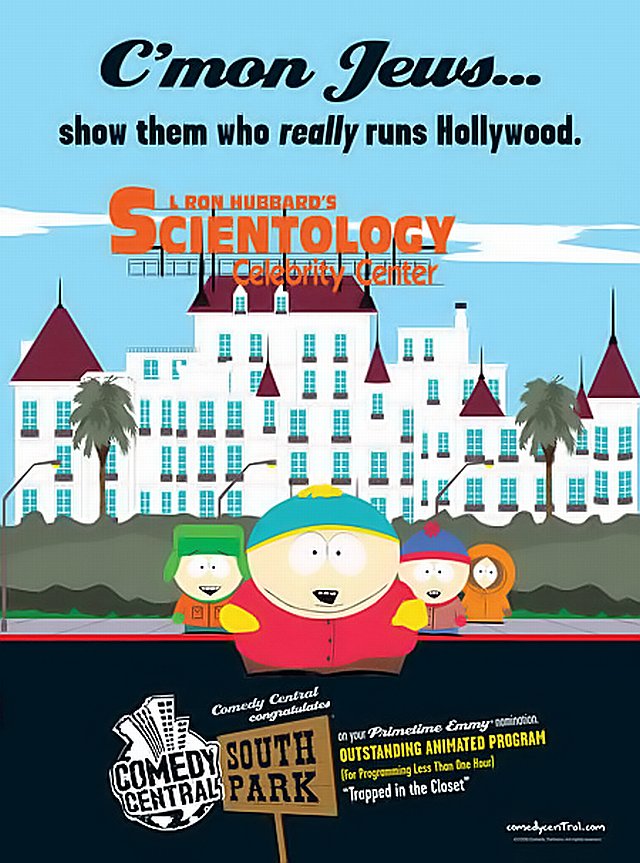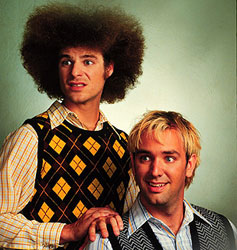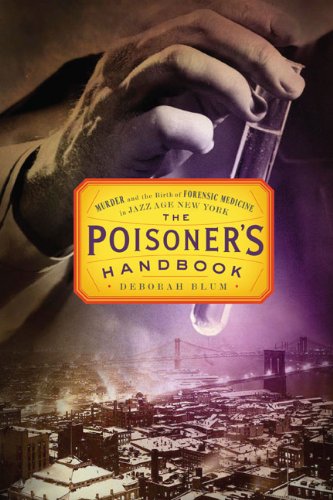
In February, the Senate Armed Services Committee discovered that the private security firm Blackwater had diverted hundreds of AK-47s and pistols from a U.S. weapons bunker in Afghanistan to Afghan policemen. Whoever signed for the weapons from Blackwater did so under a fake name: Eric Cartman. Cartman is, of course, one of the characters on Comedy Central’s South Park, the animated sitcom that’s been satirizing everything in the news and pop culture for the past 14 years. Created by Trey Parker and Matt Stone, South Park follows the adventures of grade-schoolers Cartman, Stan Marsh, Kyle Broflovski and Kenny McCormick — while tackling topics like gay marriage, Scientology and Terri Schiavo along the way. When Parker and Stone heard about the Blackwater incident, they both had the same thought: How quickly could they parody the incident on an upcoming episode? “I think our first instinct is always, ‘How do we put this in the show?’ ” Parker explains to Terry Gross. “Anytime we read anything remotely interesting we try to think how we can put it in the show.” Finding a way to sneak black-market arms trading into a cartoon about fourth-graders from Colorado wasn’t exactly a challenge: For Eric Cartman — South Park’s resident racist, anti-Semitic, power-hungry sociopath — gun running is a more likely after-school job than a paper route. Sure enough, a promo for South Park’s 14th season showed Cartman signing for a shipment of 500 AK-47s. Playing off topical events, explains Parker, is  something that South Park writers try to do on a weekly basis. “Because of the nature of our show, a lot of people by now kind of know [that] we really do the show almost like a live show,” explains Parker. “Like an SNL kind of schedule. We come in on a Thursday and then that episode airs the next Wednesday. And so in our show what happens that week ends up going on in the show.” Occasionally, their parodies have also become major news stories. In the episode “Trapped in the Closet,” Stan Marsh joins the Church of Scientology, whose members believe he is the reincarnation of church founder L. Ron Hubbard. After the episode ran once, Parker and Stone were called into a meeting with Comedy Central’s executives. “They said ‘We’re going to pull that out of rotation. We’re going to pull that episode.’ And we were like ‘Why?’ And they said ‘Because certain producers on Mission: Impossible III would rather not have it on the air,’ ” says Stone. “We’re pretty sure [it was Tom Cruise’s people] who asked for the episode to be pulled,” says Parker. Chimes in Stone: “We can’t legally say that, but we’re pretty sure it was.” “Trapped in the Closet,” which was nominated for an Emmy Award in 2006, has become one of South Park’s most popular episodes of all time. “As soon as that was pulled out of rotation, message boards started figuring it out and it became a news story,” says Stone. “And we didn’t have to do anything.”
something that South Park writers try to do on a weekly basis. “Because of the nature of our show, a lot of people by now kind of know [that] we really do the show almost like a live show,” explains Parker. “Like an SNL kind of schedule. We come in on a Thursday and then that episode airs the next Wednesday. And so in our show what happens that week ends up going on in the show.” Occasionally, their parodies have also become major news stories. In the episode “Trapped in the Closet,” Stan Marsh joins the Church of Scientology, whose members believe he is the reincarnation of church founder L. Ron Hubbard. After the episode ran once, Parker and Stone were called into a meeting with Comedy Central’s executives. “They said ‘We’re going to pull that out of rotation. We’re going to pull that episode.’ And we were like ‘Why?’ And they said ‘Because certain producers on Mission: Impossible III would rather not have it on the air,’ ” says Stone. “We’re pretty sure [it was Tom Cruise’s people] who asked for the episode to be pulled,” says Parker. Chimes in Stone: “We can’t legally say that, but we’re pretty sure it was.” “Trapped in the Closet,” which was nominated for an Emmy Award in 2006, has become one of South Park’s most popular episodes of all time. “As soon as that was pulled out of rotation, message boards started figuring it out and it became a news story,” says Stone. “And we didn’t have to do anything.”
RADIO TIMES
Fans of detective shows like CSI or the modern mystery novel know that a suspect’s guilt or innocence is often determined by a miniscule piece of forensic  evidence. But this wasn’t always the case, as science journalist Deborah Blum explains in her new book, The Poisoner’s Handbook: Murder and the Birth of Forensic Medicine in Jazz Age New York. Blum tells the story of two pioneering scientists, New York’s first chief medical examiner Charles Norris and toxicologist Alexander Gettler, who together revolutionized forensic medicine, put countless murderers behind bars, and improved public safety. This hour, we’ll hear some tales of murder and medical detection from the early years of forensic science.
evidence. But this wasn’t always the case, as science journalist Deborah Blum explains in her new book, The Poisoner’s Handbook: Murder and the Birth of Forensic Medicine in Jazz Age New York. Blum tells the story of two pioneering scientists, New York’s first chief medical examiner Charles Norris and toxicologist Alexander Gettler, who together revolutionized forensic medicine, put countless murderers behind bars, and improved public safety. This hour, we’ll hear some tales of murder and medical detection from the early years of forensic science.
Like millions of Americans, psychotherapist and author Gary Greenberg suffers from depression. In his new book, Manufacturing Depression: The Secret History of a Modern Disease, Greenberg examines how sadness became labeled as a disease that could be medicated. He wonders if in fact, what doctors call depression is often a natural reaction to the modern world. This hour, a conversation with Gary Greenberg on his own struggles as a patient and a therapist to understand what it means to medicalize our unhappiness.
On The Courage of Others, Midlake delves deeper than ever into the subdued folk it had begun to explore on 2006’s The Trials of Van Occupanther. Far from their roots as jazz students at the University of North Texas, Midlake’s members have carved out a niche of Americana that sounds both intimate and grandiose, flowing gently from delicate verses to ornate, sweeping choruses. The dark sounds of The Courage of Others didn’t come to the band easily: It spent a year writing and scrapping new material before it even began to work on the songs that would make up the new album. Recently featured as part of NPR Music’s Exclusive First Listen series, the album sounds isolated and withdrawn without devolving into desolation: A glimmer of optimism takes shape in the layered harmonies and intricately arranged guitars. In this World Cafe session, the band plays songs from the new album.

